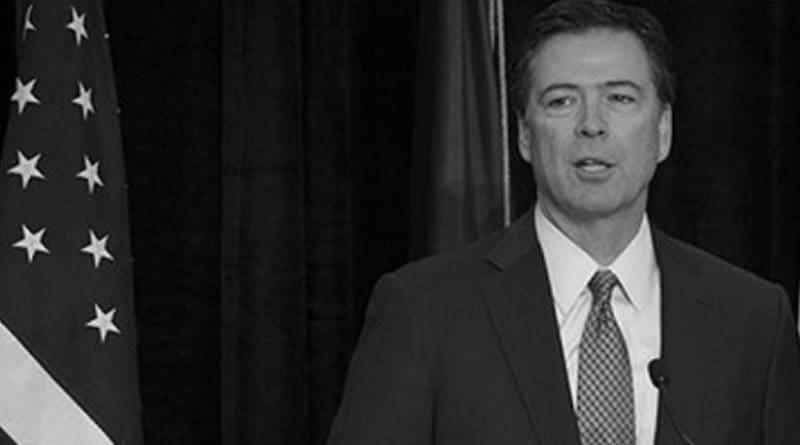Comey Says He Was ‘Defamed’ By White House
By RFE RL
By Mike Eckel
(RFE/RL) — Former FBI Director James Comey has suggested that President Donald Trump lied in describing the bureau as having major problems and said Trump’s behavior compelled him to compile detailed notes on their meetings.
Speaking to the Senate Intelligence Committee on June 8, Comey said that after he first met Trump at the White House in January, he thought he should be writing memos recounting the details of their meetings because “I was honestly concerned that he might lie.”
Comey, who was fired by Trump last month, recalled that he thought at the time: “I gotta write it down and I gotta write it down in a very detailed way.”
Comey’s stunning assertions to the Senate committee were the latest and most momentous chapter to date in the political turmoil that has gripped the White House and riveted much of Washington.
What started out as a series of unusual interactions between Trump associates and Russian officials has now been overtaken by questions of whether Trump sought to obstruct an FBI criminal investigation into his first national security adviser.
Obstruction of justice is a criminal offense under U.S. law, though there has been some debate among legal experts whether Trump, in fact, could be indicted.
A series of news reports detailing the interactions some Trump associates had with dubious Russian and other foreign officials have dovetailed with the U.S. intelligence community’s conclusion that Moscow waged a hacking-and-propaganda campaign to interfere in last year’s election campaign.
At least two congressional committees are looking into both issues, as well as the FBI, which began its criminal probe in July as the presidential race between Trump and Democrat Hillary Clinton was entering the home stretch.
Comey, who was appointed by Trump’s predecessor, Barack Obama, had given only fleeting public indications about the nature and scope of the FBI investigation. In testimony to a House committee in March, Comey revealed the existence of the investigation but said little otherwise.
One of the aides under FBI scrutiny is Michael Flynn, who was fired as Trump’s first national security adviser in February after he misled White House officials about his communications with Russian government officials.
On May 9, Trump abruptly fired Comey, claiming it was because the Justice Department had been critical of his job performance.
In his Senate comments, Comey forcefully pushed back against that, making the remarkable assertion that Trump had lied.
“The administration chose to defame me and, more importantly, the FBI by saying that the organization was in disarray, that it was poorly led, that the workforce had lost confidence in its leader. Those were lies, plain and simple,” Comey said.
Comey was asked by senators whether Trump’s suggestion that Comey should drop the investigation into Flynn constituted obstruction of justice. Comey demurred, saying that was a question for special counsel Robert Mueller, also a former FBI director.
A day after Comey’s firing, Trump held an unusual White House meeting with Russia’s foreign minister and its ambassador. According to press reports, Trump bragged about firing Comey to the Russians, calling him a “real nut job” and saying that the firing had taken pressure of his administration.
Trump’s firing of Comey prompted an outcry among congressional lawmakers. Attorney General Jeff Sessions, who heads the Justice Department and thus the FBI, earlier had been forced to recuse himself from any Russian investigations due to his own interactions with Russian officials.
Oversight would have then fell to the newly appointed deputy attorney general, Rod Rosenstein, but he co-signed the May 9 letter firing Comey. Outcry over that led to his appointing Mueller as special counsel to oversee the investigation.
A day before the June 8 hearing, the Senate committee released Comey’s written testimony, in which he details some of the interactions he had with Trump.
In that testimony, Comey said that Trump demanded loyalty from him during a private dinner at the White House on January 27, one week after Trump was inaugurated as president.
Trump has denied any wrongdoing, both in public statements and through his spokespeople.
In comments on June 7, Marc Kasowitz, the lawyer Trump has hired specifically to deal with the Russia probe, said Trump feels “completely and totally vindicated.”
But speaker Paul Ryan, the highest-ranking elected Republican in the House of Representatives, said it was “obviously” inappropriate for Trump to demand loyalty from Comey.
RFE/RL correspondent Mark Najarian contributed to this report

